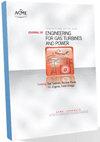Evaluation of Water-Cooling Effect in Hydrogen-Fed SOFC for High-Efficiency Combined System Design
IF 2.1
4区 工程技术
Q3 ENGINEERING, MECHANICAL
Journal of Engineering for Gas Turbines and Power-transactions of The Asme
Pub Date : 2023-10-13
DOI:10.1115/1.4063743
引用次数: 0
Abstract
Abstract If pure hydrogen is used as a fuel in high-temperature fuel cells, waste heat must be removed by air cooling, which requires increased power consumption for supplying excess air. This study presents a hydrogen-fed solid oxide fuel cell (SOFC) that uses water instead of air for stack cooling and improved system performance. A novel SOFC system with energy cascade utilization is also proposed using cooling water as the working fluid for a steam turbine. Water cooling for the SOFC stack cooling reduced the stack power and efficiency but significantly reduced the power consumption for supplying excess air by more than 60%. Under ambient SOFC operating pressure, the net power and efficiency of the proposed system were increased by 25.6% and 12.2%p compared to the air-cooled system, respectively. At an SOFC operating pressure of 1000 kPa, the proposed hybrid system with energy cascade utilization achieved improvements of 10.2% in net power and 7.5%p in net efficiency, leading to efficiency higher than 73%. This study is significant in that it proposes a novel high-efficiency SOFC system with energy cascade utilization by using two-phase water as a cooling medium and working fluid of steam turbine.基于高效组合系统设计的氢馈SOFC水冷效果评价
如果在高温燃料电池中使用纯氢作为燃料,则必须通过空气冷却来去除废热,这就需要增加供气的功率消耗。本研究提出了一种氢燃料固体氧化物燃料电池(SOFC),它使用水代替空气进行堆冷却,提高了系统性能。提出了一种以汽轮机冷却水为工质的能量梯级利用SOFC系统。采用水冷却的SOFC堆栈冷却降低了堆栈功率和效率,但显著降低了供应多余空气的功耗,降幅超过60%。在环境SOFC工作压力下,与风冷系统相比,该系统的净功率和效率分别提高了25.6%和12.2%。在SOFC工作压力为1000 kPa时,采用能量级联利用的混合动力系统净功率提高了10.2%,净效率提高了7.5%,效率高于73%。本研究提出了一种利用两相水作为汽轮机冷却介质和工质的新型能量梯级高效SOFC系统。
本文章由计算机程序翻译,如有差异,请以英文原文为准。
求助全文
约1分钟内获得全文
求助全文
来源期刊
CiteScore
3.80
自引率
20.00%
发文量
292
审稿时长
2.0 months
期刊介绍:
The ASME Journal of Engineering for Gas Turbines and Power publishes archival-quality papers in the areas of gas and steam turbine technology, nuclear engineering, internal combustion engines, and fossil power generation. It covers a broad spectrum of practical topics of interest to industry. Subject areas covered include: thermodynamics; fluid mechanics; heat transfer; and modeling; propulsion and power generation components and systems; combustion, fuels, and emissions; nuclear reactor systems and components; thermal hydraulics; heat exchangers; nuclear fuel technology and waste management; I. C. engines for marine, rail, and power generation; steam and hydro power generation; advanced cycles for fossil energy generation; pollution control and environmental effects.

 求助内容:
求助内容: 应助结果提醒方式:
应助结果提醒方式:


